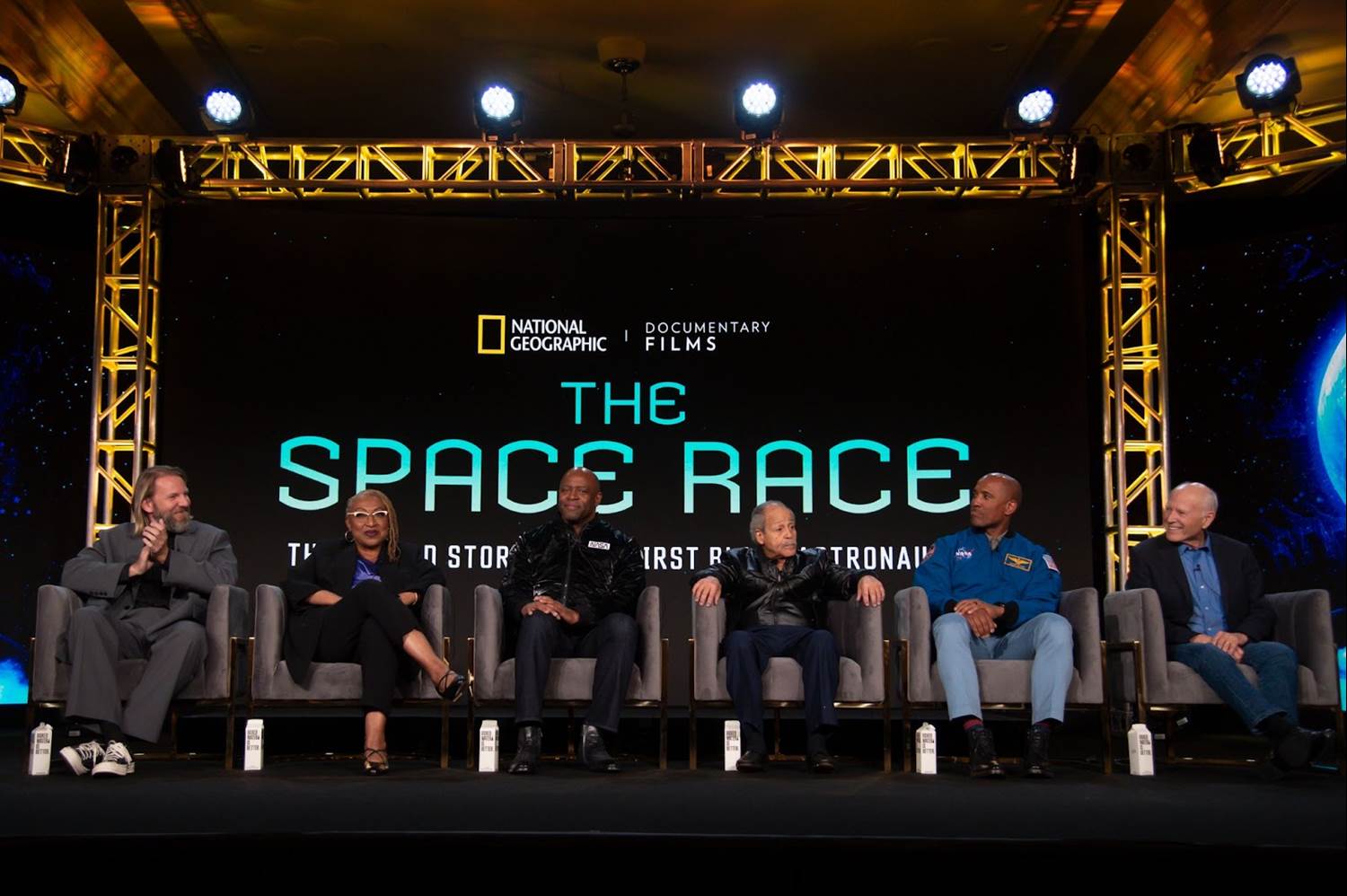“You go on this journey of discovery, and you find these stories,” said legendary film producer Frank Marshall about a new project he’s proud to be an executive producer on, National Geographic’s The Space Race. The documentary film, which launches tonight at 9/8c on Nat Geo and streams tomorrow on Disney+ and Hulu, tells the untold story of Black astronauts, but that wasn’t always the case. “This documentary started as a completely different subject,” Marshall revealed during a TCA press conference for the film. “It started with the Russian Cuban Cosmonaut and then made this abrupt right turn when we started talking to Ed [Dwight].”
“When I got this letter, November 4th, 1961, proposing this idea of being the first Negro astronaut, I thought it was a joke,” shared Ed Dwight, an Air Force pilot who was selected by President John F. Kennedy to be the first Black astronaut. As the documentary showcases, the midcentury wasn’t at a place for diversity in space, but one thing the film makes clear is that without Dwight, the door wouldn’t have been opened for a future generation. “My role in this thing for real was to start the conversation. And if I had acted a fool, if I had failed out, I could have destroyed the whole thing, and the group that came in after me would have been even further away.” Despite playing the long game, Ed Dwight never got to leave Earth’s orbit. “I was really hopeful of getting a space mission. After Kennedy died, I stayed in there fighting to get a spot, doing the best I could. I took up everything I could possibly do to stay relevant in that period of time before I left.”
“Ed came to my retirement party, and he had to tell everyone who he was before he started talking about me because no one knew who he was,” explained Leland Melvin, a retired NASA astronaut who serves as an executive producer on The Space Race and also adds to the story as an on-camera participant. Leland couldn’t blame his party guests, as there was a time when he, too, wasn’t aware of the trail Ed blazed. “One of the scenes in the movie that brings a tear to my eye is when Kennedy is killed, Ed comes back to the base, and they start asking him questions. ‘What's going to happen to you?’ He doesn't want to talk about it because it's just so ripping and moving, [his] disappointment that you see in the film.”
“The intentionality that started in the ‘70s and the ‘80s is what has led to today,” added Victor Glover, a current NASA Astronaut who appears in the film and spoke to the progress that’s been made and how things still need to go. When Victor was sent to the International Space Station in November 2020, he pushed back against narratives about him being the first Black person to do so. “These social, cultural firsts that are signs of our ignorance and prejudice, it's unfortunate. So, managing that balance, a lot of these firsts that we talk about, it's not comfortable to talk about the first, it's important to make sure the second, third, and fourth are there. That’s one of the pieces of this movie that I'm really grateful they showed, this connection of the past to the present. That means more than any individual first. And so that was a really powerful statement.”
Helping to make those statements are the film’s directors and producers. “In the film, you have Charlie Bolden, a NASA administrator, who says the important thing for him is not to be the first, it's that there are second and thirds and fourths,” added director and producer Diego Hurtado de Mendoza. “Someone had to be the first one andface the fire. But the reality is that as we talk to all these astronauts, each one of them is as much of an icon as the other; they're the humblest people. You go to them, they're incredible. And all they want to talk about is that they’re here because other people paved the way for them. And then what I want to make sure is that when I've done my job there are others that can come and do the same. That’s an incredible and powerful message. There's a really strong sense of legacy, of community. I think that’s something that’s universal and is going to inspire everyone.”
When it comes to sparking lasting change, there has to be a first, which is something the filmmakers deeply understand. “Ed is the spine of our film, he is our structural integrity,” said director and producer Lisa Cortés. “What we very quickly learned was that everyone in this very tightly grouped community looks back to Ed, looks back to the idea of the path that he opened, standing on his shoulders for a story that continues today. What I love is that our film is in conversation actively between the past and the present. The understanding that legacy and community are not separate. They're a very necessary part of engagement, particularly when it comes to the telling of narratives that have been omitted at a time when there are many places that want to outlaw the telling of this African American history. It is Ed and his indomitable spirit that has really fueled us in telling this story and providing the living receipts.”
You can hear more from directors and producers Lisa Cortés and Diego Hurtado de Mendoza in our video interview. The Space Race airs tonight at 9/8c on Nat Geo and starts streaming tomorrow on Disney+ and Hulu.

